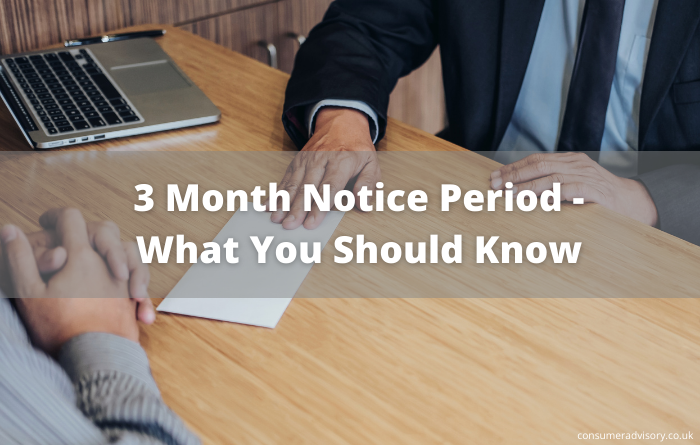
Leaving your job can be a difficult and emotional decision, but sometimes it’s just time to move on. There are many different things that you’ll need to consider when handing in your resignation, from what notice period you’ll need to give to what your next steps are going to be.
If you have a three month notice period, it can be an added complication, as you may worry that your new employer won’t want to wait for you to work your 90 day notice period. In this article, we’ll discuss exactly what is meant by a three month notice period, as well as answering all of your questions on the topic.
How Long Should A Notice Period Be?
As notice periods are agreed upon between employees and employers within the contract of employment, they can last as long or short as both parties deem necessary. The average notice period in the UK is one month, although notice periods can range from anything between one week and six months.
A notice period that is too long can have a negative impact on the work environment as well as an employee’s productivity. On the other hand, notice periods should not be so short that they cause undue stress and pressure on both parties to find replacement staff quickly after being given notice of quitting their job.
That’s why it’s so important to find the right balance when deciding on the length of notice period to stipulate in a contract of employment.
What Does It Mean To Have A 3 Month Notice Period?
Your required notice period when leaving your job will be based on the terms of your contract. That means that the length of a notice period may vary between employers as it is determined by the details contained within your contract of employment.
If you have a three month notice period, this means that you’ll need to continue working for your employer for 90 days after handing in your resignation. During this notice period, you must continue to fulfil the terms of your contract. If not, then it may result in disciplinary action or even dismissal.
What If I Need To Leave My Job Before The Three Month Notice Period Is Up?
If three months of notice is detailed within your contract of employment, it’s important to keep in mind that the duration of this period is legally binding. This means unless both parties are able to come together on terms which allow for different consequences or outcomes – such as being allowed an extension until after their existing agreement expires – there will need be no change within this time frame without mutual consent from employer and employee(s).
Some people find themselves in a position where they still have annual leave that has yet to be taken. If this is the case, you’ll need to check your contract of employment to establish whether you can take your annual leave during your notice period. Alternatively, your annual leave entitlement may come as part of your final wage package
Senior employees are often put on gardening leave when they want to move companies or take a new position. This ensures that the business isn’t left vulnerable by preventing any sensitive information from being taken to competitors who may commercially benefit.
As a senior employee, your last step before retirement might be to hand in your resignation letter – only to find yourself placed on gardening leave and not allowed to work your notice.

Will I Receive Full Pay During My Notice Period?
You are entitled to receive your full annual salary and any benefits due during your notice period, as per your employment contract. This means that you should receive any pension money, private health care, sick pay, vacation pay or maternity pay that is due, throughout the duration of your notice period.
When Does The Notice Period Start?
The notice period starts the day after you hand in your notice of resignation. That means that any holiday allowance or notice pay will be calculated from this date onwards, as well as anything else which is paid out during the notice period by law (such as statutory maternity pay).
How Will I Be Paid During My Notice Period?
As per your employment contract, you are entitled to continue receiving full annual salary and benefits throughout your notice period. If there’s a clause within it which says otherwise, this may not apply, but most employers do follow these clauses at least partially.
If they don’t provide some form of payment for part of the notice period, however, then you can make an appeal against them under the Minimum Wage Act, which states that notice pay must always be included.
You should also take a look at your employment contract to ensure that there are no clauses allowing for notice period deductions for disciplinary proceedings or other forms of misconduct – if there is then you may have grounds for contesting it and can seek advice from an expert in workplace law about how best to do this.
What If I Am Asked To Leave Immediately?
If your employer needs or wants you to leave immediately then they must give valid reasons- otherwise this will be considered as wrongful dismissal on their part and may entitle you to compensation if it’s done without a fair reason.
Keep in mind however, that just because an employee is entitled to notice doesn’t mean that the relationship has broken down irretrievably between them and the company. In many cases employees agree with employers not only about what notice period should apply but also when – so check your contract carefully before assuming anything!
If we’ve missed something out here and would like to know more about notice periods and how to calculate them, then take a look at the rest of our blog. You’ll find lots of useful information there which covers notice period laws as well as many other aspects of working life that you may be concerned with right now.

What Is The Minimum Notice Period That Must Be Provided?
If you are under a contract of employment, you’ll find that there is usually be an agreement about how much notice you must give if want to resign from your role within the company. The period specified in this section can only be altered if there is mutual consent between both parties.
If your contract of employment states that there is a three month notice period, this is the minimum notice that should be provided when the employee resigns from a company.
If no notice period is set out in the contract of employment, the statutory minimum period of notice will apply. If the employee has been employed by the company for at least one month, the minimum period of notice that should be provided is one week.
It’s always best to provide a written notice of resignation which includes your date of resignation, in order to prevent any dispute about the date that notice was provided.
Can I Take Annual Leave During My Notice Period?
If you still have annual leave entitlement remaining, you may be wondering whether you can use this up during your notice period. The answer here is not set in stone, as you always require agreement from your employer to be able to take annual leave, and during your notice period is no different.
However, it’s important to note that requests for annual leave should not be refused unless there is a valid business justification, or if there is a specific clause within your contract of employment that prevents you from taking leave on your desired dates.
How To Stay On Good Terms With An Ex Employer
Unhelpful attitudes and unprofessional actions during your notice period can have lasting effects on the workplace. Not only does it create bad blood between employee-customers, but also means you may not be able to find employment elsewhere if things go south with this company – which is never fun!
Although it is rare for an organisation to take legal action against an employee that does not work their full notice period, it’s still important that both parties maintain amicable relationships throughout. This will help to ensure that there aren’t any hard feelings later down the road. After all, you may need to rely on your former employer to provide a reference in the future.

How Can I Get Out Of A 3 Month Notice?
If a three month notice period is detailed in your contract of employment, you are contractually obliged to honour it. This means that you can only get out of a notice period that you have agreed upon in writing if there is mutual consent between both parties. If either side does not stick to the terms of the employment contract, legal action may be taken against them by the other party.
However, you may be able to shorten your notice period by using up any remaining annual leave allowance. You can also try negotiating with your employer by asking whether they would be willing to reduce the duration of your notice period at all. If they already have a replacement lined up, it could be mutually beneficial for your notice period to be shortened, as they will be able to cease paying you sooner than if they forced you to work your full notice period.
Related Questions
Is A 90 Day Notice Period Too Long?
A 3 month notice period is becoming more and more common in the UK, as companies work to increase their security and reduce staff turnover. Whilst three months notice may seem like a long time, the average time to fill a vacancy in some industries can be up to 63 days. Stipulating a 3 month notice period helps to provide the employer with the time they need to be able to fill the role and ensure business continuity.
How Do You Calculate A 3 Month Notice Period?
If your contract of employment states that you must provide three months notice to resign from your role, you will need to calculate this carefully to discover your contracted last day at work. To do this, add three months to the day after the date on which your resignation was handed in. This will give you the date of your final day of employment. You should confirm this with your HR department to ensure that both you and your employer are on the same page.
What To Do If I Have A 90 Day Notice Period
If you have a 90 day notice period, you will be required to continue working for your employee for this duration of time after handing in your resignation. This means that you will not be able to start a new job for 90 days after informing your current employer that you wish to leave your position in the company.
The only way that this 90 day notice period can be waivered is if both the employee and employer agree in writing to shorten the notice period. This would mean that the employee would not be paid for the contracted notice period, and would not be required to work for the duration of the notice period.
In Summary
So, as you can see, there are a lot of different things to consider when it comes to notice periods and how this may impact your employment. It’s important to ensure that you fully understand your notice period before you begin applying for alternative positions, so that you’re best placed to converse with your new company about your potential start date, should you be successful in gaining alternative employment.
If you are subject to a 3 month notice period, you will need to ensure that your new company is happy to wait the full 90 days before you can commence your employment. Whilst some employers may be open to negotiation when it comes to shortening your notice period, many will insist on the full three months being worked, so it’s important that you ensure that you are able to work your full notice after resignation if required.
